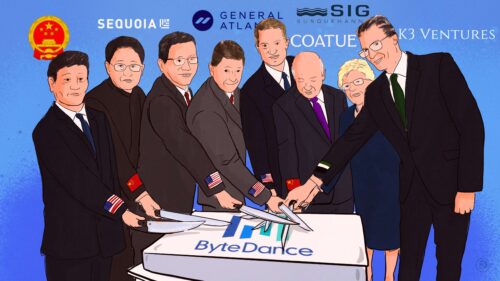Chinese tech will lose more than money as Biden blocks U.S. venture capital, but P.R.C. startups can look elsewhere
Funds run by U.S. tech giants Google, Qualcomm, and Intel could miss out on China plays, and their partners will miss access to American know-how. But global VCs are waiting in the wings.

Chinese startups could miss American know-how as much as they’ll miss U.S. venture capital soon to be barred from flowing across the Pacific by restrictions aimed at firms whose products might aid China’s military. But observers say China’s investment ecosystem won’t suffer too badly.
President Joseph Biden signed an executive order on August 9 designed to block American dollars from funding Chinese companies developing artificial intelligence, semiconductor, and quantum computing technologies that can have military applications. The restrictions are expected to take effect sometime in 2024.
In addition to blocking American capital from flowing to companies that could develop technology to aid the People’s Liberation Army — now the largest military in the world — the proposed regulations put forward by the U.S. Department of the Treasury would stem Chinese startups’ access to “intangible benefits” offered along with investment by venture funds run by such U.S. tech giants as Google, Qualcomm, and Intel, and by American venture capital firms such as GSR Ventures and Andreessen Horowitz.
The draft regulations said that those benefits include “managerial assistance, access to investment and talent networks, market access, and enhanced access to additional financing.”
Sources told The China Project that the Biden administration is concerned that Chinese startups taking American venture capital or private equity investment might gain access to experts on cutting-edge technologies retained as advisers to American investment firms.
In recent years, as relations between Beijing and Washington soured, making investment restrictions seem increasingly likely, many U.S. investment firms began to reduce their exposure to China. In June, Sequoia Capital — an early investor in Apple, Google, YouTube, and Zoom — spun off its China operations into a separate business.
Overall, U.S. venture capital investment in China fell to a 10-year low of $1.3 billion in 2022, off its 2018 peak of $14.4 billion, data from Rhodium Group, an independent research firm, showed.
From 2014 to 2019, U.S. VCs targeted Chinese startups working in AI more than any other sector, Rhodium data showed. Those first-generation Chinese AI startups, and new ones springing up all the time, look set to lose out on some of the key benefits of working with American investors.
VCs such as DCM Ventures, which has offices in Silicon Valley, Beijing, and Tokyo, have put billions into Chinese tech startups and now are concerned about the barrier to progress Biden’s executive order threatens.
“It will certainly change the manner and structure of how DCM invests in one of the areas referenced therein: artificial intelligence,” DCM said in an email to The China Project.
China news, weekly.
Sign up for The China Project’s weekly newsletter, our free roundup of the most important China stories.
Intangible benefits
Among the advantages of working with American investors is access to experienced alumni of U.S. startups and established tech companies who can offer both technical expertise and advice on how to apply that knowledge to shape a viable business model.
American VCs sometimes pay seasoned veterans of established tech companies to help them make investments and support companies in their industries, Tim Fist, a Center for a New American Security (CNAS) fellow with experience in multiple tech startups, said. In the AI space, for example, this has involved VCs bringing on advisers from places like OpenAI and DeepMind.
These experts can offer guidance to Chinese startups looking to tackle some of the same issues as their American counterparts.
“I think this comes out in a fairly fuzzy, unstructured way,” Fist told The China Project. “A series of conversations and other sorts of support activities, like sending over thoughts and documents and things that lead companies down a certain path of approaching a technical problem in a particular way. It doesn’t necessarily need to be like, ‘I’m sending you the secret documents.’”
Some American VCs have steered clear of the People’s Republic of China.
“DCVC does not invest in P.R.C.-connected startups or support P.R.C. economic goals,” Matt Ocko, co-founder and managing partner of the Palo Alto, California, firm that manages $3 billion, said in an email to The China Project. “As a firm, we stand with America and her allies against the P.R.C.’s drive for global hegemony, and our partners are proud of having helped shape the investment ban in question.”
Ocko was an early investor in online video conferencing platform Zoom, which some critics note hosts a data center in China, where the Communist Party could insist on access.
VCs’ value-add
With scads of money and the limelight of prestige as incentives, observers said VCs often are better able than consultants to attract the best experts in the field to help a startup grow.
“A VC firm captures so much upside if the investment is successful that they can afford to pay someone a ridiculous amount to come on as an adviser,” Fist of CNAS said.
American VCs also are plugged into the broader U.S. economy — still the largest in the world — in ways that enable them to funnel more money into startup companies than their VC counterparts from around the world.
“In other words, it is very common for a typical U.S. pension fund or endowment to allocate 1-2% to VC and another 10% to PE,” an investor with longtime China business experience who asked to remain anonymous said. “The Chinese ecosystem is much less efficient, lacks transparency, and faces all sorts of other frictions you see in China.”
China-based VCs
Not all American VCs offer access to industry insiders as a part of their investment. Some take a less involved stance with their portfolio companies.
“There can be a wide range between those early-stage investors that take a more direct vs. a more hands-off approach to startup investments,” Reva Goujon, Rhodium Group’s China Corporate Advisory director, said.
Some China-based VCs that funnel U.S. money to Chinese companies could be affected by Biden’s investment ban, but these firms don’t tend to leverage U.S.-based experts to help their portfolio companies.
For Qiming Ventures, a Shanghai-based firm with $9.5 billion in assets under management and over 500 all-Chinese companies in its portfolios, U.S. government concerns over intangible benefits are less relevant.
“What the executive order really focuses on is technology transfer from U.S. firms and U.S. entities to Chinese firms and Chinese entities,” Gary Rieschel, Qiming’s founding managing partner, said. “But within a Chinese venture firm’s portfolio, since all the firms are Chinese, you’re really transferring intellectual property between Chinese firms.”
China might not suffer
Some investors note that China’s own investment ecosystem has begun to attract investors from other countries who likely would bring to the table some of the same intangible benefits Biden is afraid America will give away.
Rieschel said that when Qiming began investing in China in 2006, many companies needed advice on the basics of organizing a business.
“Back then, it was hard to find even an experienced CEO, because you were really in your very first-generation venture capital in China,” Rieschel said. Next, he said, there were lots of CEOs but companies had to ask, “Can you find a complete team?”
“Now, in most cases, you can find complete teams with solid CEOs that have experience.”
VCs value management. A Harvard Business Review survey of nearly 900 VCs found that assessment of a startup’s founders was the most frequently cited factor in their decision to make an investment.
U.S. VCs aren’t necessarily better at spotting winning management than their international counterparts, the anonymous investor with longtime China business experience said, noting that China’s startups are looking for intangible benefits far and wide.
In August, German investor Bertelsmann announced it would put $700 million into Chinese startups, and Chinese VCs also have looked to Middle East funds as U.S. investment has declined.
“There is a myth about Silicon Valley that it provides all this unique value that no one else can provide by virtue of being based in Northern California,” the anonymous investor said. “I have worked with smart, informed, and capable investors from China, Singapore, Silicon Valley, Germany, the U.K., Israel — I don’t see much of a difference.”






